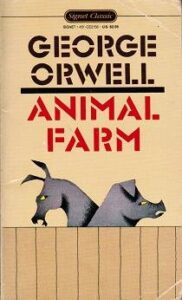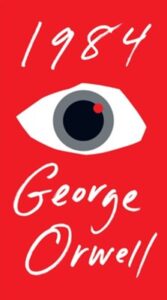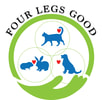
Cover of the first American edition, available in RUL
If there’s only a single book you can recommend to readers of all ages to explain the concept of banning books, what would that title be?
The question is similar to the desert-island conundrum: what book would you take with you to a desert Island? We have answered that one during Covid, one by one. So let me start with my recommendation: Animal farm by George Orwell. With books banned for their language or race- and gender-related topics, this title may not sound like the most important book in 2024, but it’s one of the most indicative texts to help understand why any group would challenge the reading preferences of another.
Animal farm and your borrowing history
My choice is somewhat given as, growing up in a dictatorship, I did not enjoy free speech and did not have access to books outside the party line. The concept of the three P’s (promoted, permitted, prohibited) allowed us English majors to read titles restricted to the general population. Of course, a record of you having read that book was carefully stored in the library system, a practice that makes any American librarian cringe. By the way, did you know that, when you ask library staff about books you read previously, we really have no idea? Rutgers and other academic library systems never keep a record of what you have borrowed. Public library audiobook platforms, strictly for your convenience, list the history of books previously borrowed, but you can delete it in just a single click.
Animal farm, the classic fable
First published in 1945, Animal farm has become a classic fable depicting an anthropomorphic vision, a satirical allegory how dictatorships evolve, based on the events in the Soviet Union in the first half of the 20th century. The story is quite simple: hard working farm animals rebel against their master, chase him away, and take over the farm. So far so good, but instead of living in democracy and peace as envisioned, the same animals turn the farm into a totalitarian dictatorship, where, eventually, it all boils down to a single, paradoxical axiom: “all animals are equal but some animals are more equal than others.”

The entrance of the brave little village library challenged for displaying a banned book in Hungary (photo: JH Ward, 2024)
Animal farm: Accessing the banned book
Animal farm was listed as recommended in one of our English literature classes. Recommended, which means it was not part of the mandatory books on the reading list. It couldn’t have been, simply because there were not enough copies for all of us, a whopping 10 of us majoring English and Hungarian at the second largest university in the country. A minor inconvenience – we overcame bigger issues than that, even without the modern 21st-century conveniences of duplicating, scanning, photocopying, and sharing text in other ways. Even if the technology existed, reproducing material was strictly under control in communist Hungary. It slips my mind when and where I got my own copy. Mind you, it hadn’t been translated into Hungarian until the mid-1980s in a samizdat edition, and of course, it wasn’t something you could have found in bookshops or libraries. History seems to repeat itself as books are challenged by a new law, along with libraries that place them on their shelves.
Animal farm for all readers
Why would I want to give a copy of Animal farm to anyone from ages middle school to retirement homes? In the parable genre, which is as old as literature, Animal farm competes with the best fables of Aesop and La Fontaine, even if the text itself is a bit longer and the allegory is a bit more complicated. It means more time to read, but it also it comes with deeper and more meaningful messages. As such, the book offers a lot of talking points to readers of all ages, diverse angles to look at the plot and the characters, and even more to reflect on, whether in a group setting or alone. Published in many editions, the book cover went through fascinating changes throughout the decades.
Animal farm and young readers
Written during the last few years of World War II as a political satire, Animal farm was definitely not meant for children. However, growing up with animal tales and beast stories, young readers are able to grasp how animals behave and relate to each other – better than their human counterparts. These stories are timeless and not tied to a specific location. As such, readers from diverse cultures are able to understand basic human traits and behaviors through the characters in Animal farm, such as the fearless leader Napoleon, his rival Snowball, the agit-prop Squealer, the self-centered and vain Mollie, the sacrificed young pigs, the brainwashed puppies as enforcers, the no-name, no-personality sheep, the double-faced cat, and many other unnamed animals, insignificant for power struggles. Concepts that prevail in our culture such as gaslighting have plenty of examples, from blaming Snowball for damaging the windmill (show trials) to rewriting history (retouching historical photos: making unwanted leaders disappear).
 Animal farm in the era of social media
Animal farm in the era of social media
The book is a perfect tool to teach critical thinking: why it’s important, how it works, and what it means to be deprived of the possibility of thinking critically. For the digitally-minded, private censorship on social media can also be well explained with examples from the book: post only what a certain group endorses, even if it means rewriting and retouching history or spinning reality according to the group’s narrative preferences, a.k.a. “Newspeak,” the controlled language with limited vocabulary and grammar used in the totalitarian dictatorship of Orwell’s masterpiece, Nineteen Eighty-four.
1984 covers all topics presented in Animal Farm in a lot more detail: totalitarian dictatorship, the dangers of lacking free speech, being constantly monitored by Big Brother, gaslighting and other ways of manipulating reality, living in fear, and most importantly, the power of language.
Animal farm and our language
Phrases from both books by Orwell have infiltrated our language. “Call your dogs off!” Dogs, standing in for the secret organization to enforce power in the story, are taken in the book as young, impressionable puppies only to be fully brainwashed and indoctrinated. Does this sound familiar? Perennial? “Four legs good, two legs bad,” one can’t explain exclusion any better. More seasoned and well-read audiences will enjoy deciphering the simplicity of the sentence structures across the story and drawing parallels with contemporary “news speak” [sic!].
Animal farm, setting an example
Just to be clear, I am not talking about politics, workplace challenges, or relationship and trust issues. The overarching topic in the book, that is, the strong desire for power and what one is capable to do on the road to achieve it, speaks for itself. The only thing left for the individual in a corrupt environment is integrity, the ability to tell right from wrong in all situations and act accordingly. Animal farm shows how the slightest slip toward dishonesty will corrupt the individual. Intransigence, a trait often with negative connotations, just might be the answer even if it means refusing to compromise from an extreme position.
Animal farm, a classic for all to re-read
Re-reading the book in a different phase of one’s life is always exciting as we have an accumulated new knowledge and experiences about the world since we first read the book. More importantly, the world around us has also changed significantly. Reading a classic again during difficult times, whether personal, professional, or political, might just be the key to shedding new light on what’s happening around you and looking at the problem from a fresh perspective, which often results in a solution. As strong believers in bibliotherapy and guided reading, we can recommend Animal farm for re-reading and discussion for groups and book clubs.
 For the record: “Four legs good” should be a name of a pet rescue nonprofit!
For the record: “Four legs good” should be a name of a pet rescue nonprofit!
. . . and it is! Here in New Jersey!
Read more from Rutgers Libraries
- Green, J., & Karolides, N. J. (2005). The encyclopedia of censorship. (Rev. ed. / Jonathon Green, Nicholas J. Karolides.). Facts On File.
- Karolides, N. J. (1998). Literature suppressed on political grounds. Facts on File. – A collection describing books often censored and suppressed for their content, including cultural landmarks and classics.
- Karolides, N. J., Bald, M., & Sova, D. B. (2011). 120 banned books: censorship histories of world literature (2nd ed.). Facts on File, Inc. – The books featured in this volume were challenged on political, sexual, or social grounds.